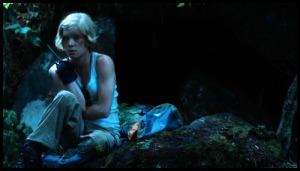2010
Directed by Jesse Holland and Andy Mitton
Way back in 1940, the small town of Friar, NH, mysteriously set out upon a mass exodus into the woods and never returned. 70 years later, records of the incident have finally become declassified. A ragtag team of explorers sets off to follow their trail to find out what happened. The team is led by Teddy (Michael Laurino) and Melissa (Anessa Ramsey), who are hoping to write a book about their experience. They bring their psychologist friend Walter (Alex Draper), who will be conducting psychological tests on the group over the course of the expedition. Also along for the ride are Daryl and Erin (Clark and Cassidy Freeman), the cartographers; Cy (Sam Elmore) the forestry expert; Jill (Tara Giordano) the intern; and Liv, a local who knows where the trail starts and may have other secrets as well. Following proper horror convention, once the group starts to get deep into the woods, things begin to go very wrong.
As you might expect from the title, this movie contains some references to The Wizard of Oz. I liked that the references weren’t heavy-handed, though. There’s the eponymous trail, a field with red flowers that may or may not have been poppies, and one spooky-ass scarecrow. There’s also the theme of needing to travel further into the woods in order to get home. And early in the movie, Liv shows Teddy a film reel of The Wizard of Oz, which has been completely worn out by the townspeople’s desperate attempt to escape their situation through cinema.
One admirable thing about the movie is the way it uses its soundtrack. Music drives the movie, instead of merely providing background or a cue for a jump scare. Once the group starts hearing old-timey music in the woods, it becomes an antagonistic force that slowly begins to drive the team mad. The group theorizes that the music is coming from a town that the original group founded at the end of the trail, but that doesn’t explain how excruciatingly loud it is, or how it seems to stop and start at odd intervals. Along with the music, there are all kinds of other strange occurrences. Their GPS shows their location as being in places as far away as Guam and Italy. The cartographers take different measurements moving toward the music than away from it, marking down numbers that make sense while they’re traveling but become useless otherwise. And Daryl forms a murderously strong attachment to an old hat.
Daryl is one of the first to exhibit signs of mental breakdown, and acts as a bookend to the group’s descent into madness. He’s the first one in and the last one out. Everyone goes crazy in their own special way. Walter’s psychological tests start out with nobody taking them seriously, since they’re very easy and a little weird: speaking in gibberish, counting in prime numbers, describing the taste associated with the color red. But then as time goes on, they become more earnest about solving the tests. Their frustration as they struggle is pretty disturbing. The actors are really good at showing the gradual breakdown, especially with Liv’s dogged determination to recite the alphabet backwards.
I won’t spoil the later parts of the movie, but things get pretty creepy, in a Lynchian sort of way. There’s a particular scene where Melissa has just finished an emotional walkie talkie call to Teddy when she hears a voice coming from a small cave behind her. “Melissa, I want you to know that I’m here. In the cave. Behind you.” Though the conversation itself is very calm and almost resigned, this scene really had me on the edge of my seat. The blackness of the cave leads me to expect something frightening to pop out at any moment. And given that the characters in the movie have been experiencing a lethal psychological meltdown, it’s not unreasonable to expect some hideous cave monster to pop out a la The Descent. It’s only Daryl, though: an entirely human sort of monster.
It’s a coincidence that I watched this after Twin Peaks, because the Lynchian adjective applies to pretty much the remainder of the movie, right through to the short-tempered usher in a theater that may or may not exist. Maybe watching Twin Peaks beforehand just made me more attuned to the more surreal elements of the movie, though. Either way, despite an ending that didn’t really do it for me, there’s enough that’s positive, or at least interesting, about the movie to make it worth seeing. And there’s a moral, too: Be happy with your situation. Don’t go into the woods.
